FAFO Parenting Explained: Why Letting Kids Fail Can Help Them Thrive
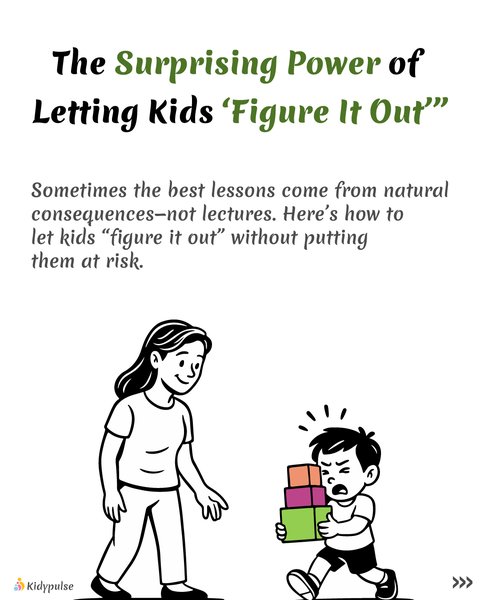
Discover the FAFO parenting approach and learn how letting kids make safe mistakes builds resilience, confidence, and problem-solving skills.
Introduction: The Jacket Battle and the Birth of a Parenting Buzzword
It is a scene that plays out in households across the world with near-universal certainty: a child, resolute and defiant, refuses to wear a jacket despite the biting cold outside. The ensuing power struggle can involve pleading, negotiating, and ultimately, a frustrated parent wrestling a shrieking child into a coat just to get out the door. But a growing number of parents are choosing a different path, one captured by a provocative, trending acronym: FAFO.
FAFO is the internet slang for "F*** Around and Find Out". Its aggressive, confrontational origins in online culture have been co-opted into the
parenting lexicon to describe a specific, hands-off approach to certain child-rearing dilemmas. The core idea is simple: instead of forcing compliance, a parent allows the child to step outside without a coat and "find out" for themselves just how cold it is.
This report provides a comprehensive analysis of FAFO parenting, moving beyond the meme to explore its psychological underpinnings. When understood and applied correctly—within a carefully constructed framework of safety, love, and connection—this approach is not about being harsh or neglectful. Instead, it is about leveraging the powerful, research-backed principle of natural consequences to raise independent, resilient, and capable adults.
Deconstructing FAFO: More Than Just a Meme
The Core Philosophy: Learning Through Natural Consequences
At its heart, FAFO parenting champions the idea that children learn best by experiencing the direct, natural outcomes of their decisions. Rather than a parent intervening to prevent a negative outcome or assigning an unrelated punishment, the consequence flows directly from the child's action. This form of experiential learning is often far more potent and memorable than any parental lecture. While the name is new, the concept is not; it is a modern rebranding of a foundational developmental principle that recognizes humans, including children, learn effectively through cause and effect.
Distinguishing Consequences from Punishments
A critical distinction must be made between natural consequences and parent-imposed punishments. The FAFO approach, when implemented correctly, deals exclusively with the former. Parenting coach Julie Romanowski illustrates the difference with a simple scenario: a child wiggling on a wobbly chair. The natural consequence is that the child might fall off. A parent-imposed punishment, by contrast, would be taking away dessert for wiggling.
Natural consequences are not created by the parent; they are the inherent result of an action. If a child plays too roughly with a toy, the natural consequence is that the toy breaks and is no longer usable. Punishments, on the other hand, are arbitrary and designed by the parent to control behavior, such as grounding a teenager for poor grades or canceling a birthday party because of rudeness.
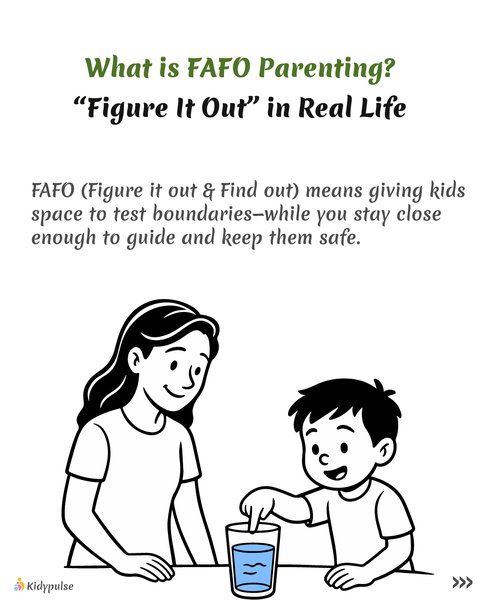
A Cultural Counterpoint
The rise of FAFO parenting can be seen as a cultural reaction to the perceived extremes of other modern parenting styles. It offers a middle ground between "helicopter parenting," where parents hover and remove all obstacles, and certain interpretations of "gentle parenting," which some critics view as overly permissive. Many parents, feeling exhausted by constant negotiations and the pressure to perfectly manage their child's every emotion, are drawn to FAFO's perceived simplicity and clarity.
However, the provocative name is a double-edged sword. While it effectively grabs attention and resonates with frustrated parents, its aggressive connotation is the primary source of misunderstanding. This language can imply a punitive or adversarial stance, leading critics to conflate the approach with harsh, authoritarian, or even neglectful parenting. In reality, proponents consistently clarify that the method is not about being cold, punitive, or negligent. The core tension is that the marketing—the name itself—is often at odds with the intended principle of allowing learning through natural consequences within a supportive and loving environment.
The Science of Struggle: The Psychological Benefits of Productive Failure
Allowing children to experience small, safe failures is not an abdication of parental duty but a strategic investment in their long-term psychological health. The process of struggling with a challenge and recovering from a setback provides a host of developmental benefits.
- Building the Resilience Muscle. Coping skills are frequently compared to muscles: they only grow stronger when they are used. When parents allow children to experience and navigate minor setbacks, such as frustration over a difficult puzzle or disappointment after losing a game, they are giving them an opportunity to build tolerance and expand their capacity for managing these feelings in the future. This process of bouncing back from adversity is the very definition of resilience. Children who learn to overcome small challenges develop the confidence that they can handle larger problems down the road.
- (unlocking-your-childs-potential fun-brain-boosting-activities-for-every-age. Failure is a powerful catalyst for critical thinking. When a child's initial attempt at something does not succeed, they are prompted to analyze what went wrong, consider alternative strategies, and adjust their approach. This is a potent form of experiential learning that shifts the dynamic from a power struggle with a parent to a moment of self-discovery. Every time a parent swoops in to rescue a child, it represents a "lesson lost". Research shows that children as young as five and six are already experienced problem-solvers capable of using deductive reasoning to interpret clues and find solutions.
- Cultivating Genuine Self-Confidence and Independence. When parents consistently rescue children from difficult situations, they may inadvertently send the message, "You are not capable of handling this on your own". This can foster dependency and erode a child's belief in their own abilities. Conversely, when a child successfully navigates a challenge independently, it builds a robust sense of self-concept and
genuine self-confidence and independence. They learn to trust their own judgment and problem-solving skills.
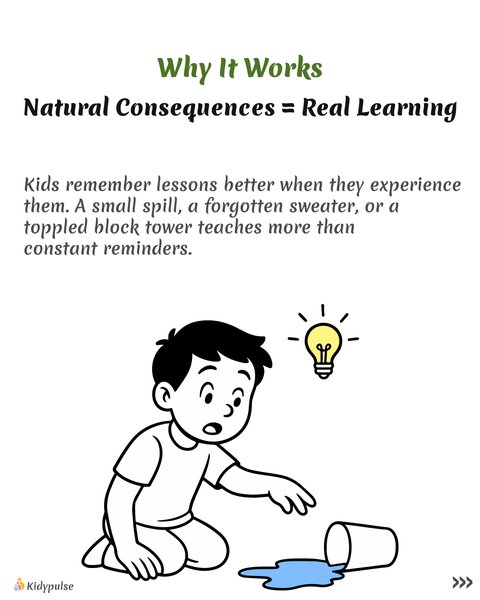
- Developing Emotional Regulation and Frustration Tolerance. Shielding children from all negative feelings does not make them safer; it can make them more fragile. Experiencing mild to moderate levels of frustration, disappointment, or sadness within the presence of a caring and supportive adult is essential for learning how to regulate those emotions. Clinical psychologist Dr. Amanda Mintzer notes that the ability to tolerate imperfection—that something is not going exactly as planned—is often a more important life skill than the specific academic content being learned.
- The Power of "Desirable Difficulties." Psychologists Elizabeth and Robert Bjork coined the term "desirable difficulties" to describe challenges that enhance long-term learning. Their research shows that information learned through a process that involves struggle is stored more effectively and durably in the brain than information that is acquired easily. By making life too easy for children and rescuing them from every fall, parents may be preventing these deeper, more permanent lessons from taking root.
The psychological benefits of this process follow a clear causal chain. It begins with a Safe Failure, such as a child forgetting their homework. This leads to Emotional Discomfort, like anxiety about the teacher's reaction. The crucial next step is Supported Problem-Solving, where the parent, instead of rescuing or shaming, empathizes and debriefs with the child afterward ("That must have been tough. What could we do to remember it next time?"). This leads to
Skill Acquisition, as the child develops coping mechanisms and practical strategies. The final result is Increased Confidence and Resilience, as the child, having successfully navigated the problem, feels more capable and less fearful of future mistakes. If the parent skips the supportive step, this positive chain is broken, and the experience can lead to anxiety and helplessness rather than growth.
The Parenting Spectrum: Where FAFO Fits In
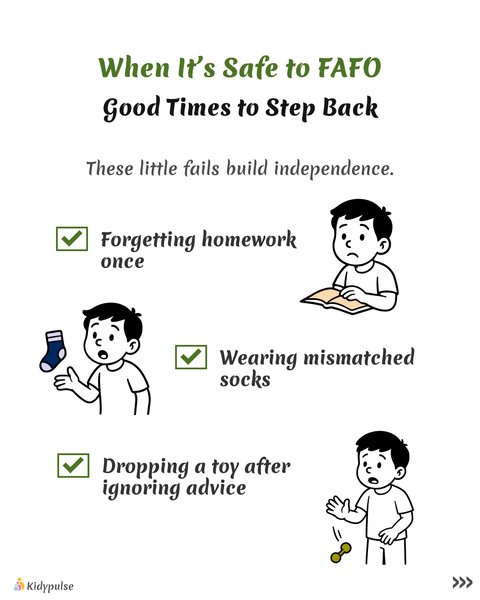
FAFO is not a comprehensive, standalone parenting philosophy but rather a specific tool or tactic. Its effectiveness and ethical standing are entirely dependent on the broader parenting style within which it is applied.
- FAFO vs. Helicopter/Snowplow Parenting. This is the clearest and most direct contrast. Helicopter or "snowplow" parents actively hover, remove all obstacles from their child's path, and rescue them from any potential failure. This approach can stifle the development of self-reliance and resilience. FAFO is the philosophical opposite, operating on the belief that children
need to encounter and navigate manageable obstacles to build essential life skills. - FAFO vs. Permissive Parenting. Permissive parents are characterized by high levels of warmth but low levels of boundaries and expectations. They often avoid conflict and may not consistently enforce rules. While FAFO allows a child freedom of choice, it is fundamentally about accountability. The "Find Out" phase is the enforcement of a boundary, not by the parent, but by reality itself. It is therefore distinct from the boundary-less nature of permissive parenting.
- FAFO vs. Authoritarian Parenting. Authoritarian parents exhibit high control and low warmth, relying on strict, non-negotiable rules and punishments, often justified with "because I said so". Some critics have labeled FAFO as merely a new name for authoritarianism. However, this comparison fails to recognize the critical distinction: true FAFO relies on
natural consequences, not parent-devised punishments, and is ideally practiced with the warmth and connection that is antithetical to the authoritarian style. - The Authoritative Connection: The "Sweet Spot." Decades of research identify the authoritative parenting style as the most effective for raising well-adjusted children. This style combines high warmth and responsiveness with clear, consistent expectations and limits. Crucially, authoritative parents often allow natural consequences to occur, using them as teaching moments for growth and learning. FAFO, therefore, is best understood not as a separate style, but as a tactic or "subgenre" that fits perfectly within the authoritative framework. It is the practical application of the authoritative principle of "learning from consequences."
The context provided by the parent's underlying style is what determines whether FAFO is a constructive tool or a destructive weapon. Consider the same action—a parent stepping back from the jacket argument—applied with different intentions. An authoritative parent steps back but remains emotionally available, saying, "I'll be right here with the warm jacket when you feel you need it." The underlying message is one of love, support, and trust in the child's ability to learn. An authoritarian parent, however, might step back and say, "Fine, freeze then. It serves you right for disobeying." The message here is punitive and shaming. A neglectful parent may not even notice the issue, leaving the child truly on their own. The same action produces wildly different developmental outcomes, demonstrating that FAFO is only a positive tool when wielded by an authoritative hand.
Navigating the Pitfalls: The Critical Boundaries of FAFO Parenting
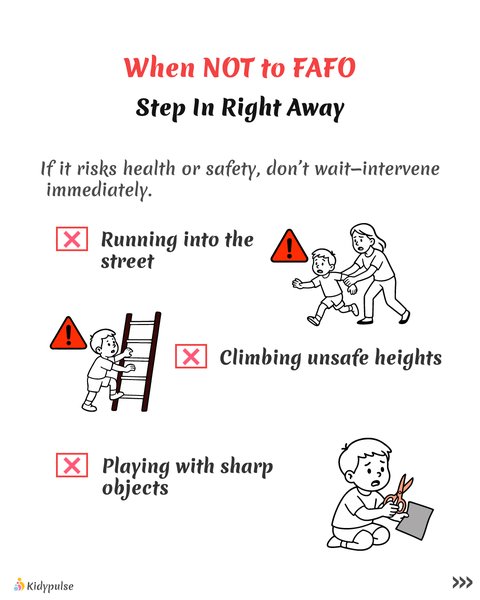
While allowing children to learn from their mistakes is powerful, this approach requires careful judgment and firm boundaries. Applying it incorrectly can be ineffective at best and harmful at worst.
- The Non-Negotiable Rule:(empowering kids why early personal safety education matters. The absolute, universal boundary is that FAFO never applies to situations that involve a risk of serious physical or emotional harm. Letting a child "find out" what happens when they run into a busy street, touch a hot stove, or bully another child is not a learning experience; it is negligence. The principle of natural consequences is only appropriate when the outcome is safe, contained, and emotionally manageable for the child.
- The Empathy Imperative: Connection Before Correction. FAFO without empathy can be easily misinterpreted by a child as abandonment, indifference, or a lack of care. The parent's role is to remain a source of love and support, a safe harbor to return to after the "finding out" is over. It is crucial to avoid the "I told you so" trap. Shaming a child for their mistake undermines the lesson and can cause significant damage to the
parent-child relationship. The follow-up conversation should always be empathetic and forward-looking: "That didn't go how you hoped. What do you think you could do differently next time?". - Recognizing Unsuitability: FAFO is Not One-Size-Fits-All. This approach must be tailored to the individual child and their developmental stage.
- Developmental Stage: Toddlers and very young children lack the advanced cognitive ability to connect their actions with delayed consequences or to accurately foresee serious danger. For this age group, consequences must be immediate, simple, and concrete. You can learn more about your child's
developmental stage. - Child's Temperament: The FAFO approach may be too harsh for highly sensitive children, who might experience the emotional weight of failure as devastating rather than instructive.
- Neurodiversity: Children with conditions such as ADHD, anxiety disorders, or trauma histories often require more structured support, scaffolding, and explicit instruction. Simply exposing them to natural consequences may be ineffective or even counterproductive, as a tough lesson will not rewire their underlying brain chemistry.
- Developmental Stage: Toddlers and very young children lack the advanced cognitive ability to connect their actions with delayed consequences or to accurately foresee serious danger. For this age group, consequences must be immediate, simple, and concrete. You can learn more about your child's
- The Risk of Encouraging Dishonesty. One of the most significant yet subtle risks of a poorly applied FAFO approach is that it can inadvertently teach children to lie. If a child learns that admitting a mistake consistently leads to an unpleasant consequence that their parent could have prevented, the incentive to be honest is diminished. Hiding problems becomes a safer strategy than seeking help. This fundamentally breaks trust and positions the parent as an adversary rather than an ally.
Ultimately, the long-term health of the parent-child relationship is a more important outcome than any single lesson learned. If applying a FAFO-style consequence risks damaging trust or making a child feel that they cannot come to their parent for help, it is the wrong tool for the job. The guiding question for a parent must always be: "Is this action teaching a valuable lesson, or is it teaching my child not to trust me?"
FAFO in Action: A Practical Guide to Creating a "Safe-to-Fail" Environment
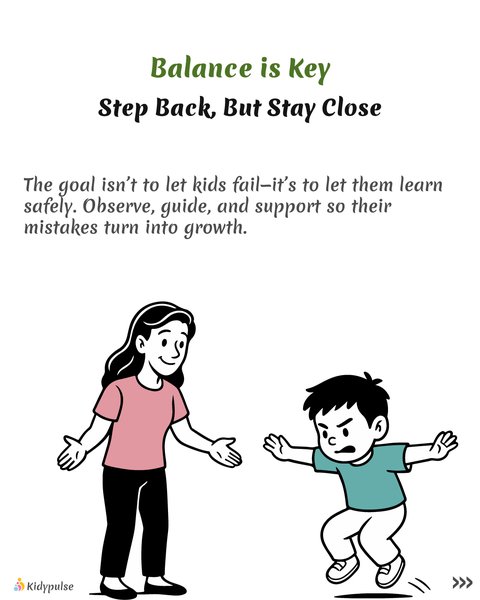
Effective FAFO parenting is more proactive than reactive. It involves intentionally designing a home environment where it is safe for children to experiment, make mistakes, and learn from them. This requires building a foundation of psychological safety before the failures occur.
Key Principles for Creating Psychological Safety
- Model Fallibility. Parents can normalize imperfection by being open about their own mistakes and demonstrating how they learn from them. Saying "Oops, I forgot to buy milk. I'll add it to the list for next time" shows a child that mistakes are a normal part of life for everyone.
- Praise the Process, Not Just the Outcome. The focus should be on a child's effort, persistence, and courage to try something new, regardless of the result. Praising the process teaches children that their self-worth is not tied to their successes or failures.
- The Post-Failure Debrief. The conversation that happens after the consequence is the most critical part of the process. This is the time to connect with the child, empathize with their feelings, and collaboratively problem-solve for the future, all without shaming or blaming.
- Collaborate on Recurring Problems. If a child repeatedly makes the same mistake, such as forgetting their lunch every day, the goal is not to let them go hungry indefinitely. Instead, this signals a need for collaborative problem-solving. The parent can work with the child to create a system for success, such as a morning checklist. This reinforces the parent's role as a supportive ally. You can learn more about how to
collaboratively problem-solve for the future.
Age-Appropriate Examples
- Toddlers (Ages 1-3): Consequences must be immediate, concrete, and absolutely safe.
- Refusing to wear shoes: Allowing them to briefly step onto a cold, wet, or slightly uncomfortable surface can quickly teach the value of footwear.
- Running too fast: A minor tumble on a soft surface like grass or carpet helps them learn to moderate their speed and body control.
- Throwing a toy: The toy is calmly taken away and put out of reach for a short period, teaching that misuse leads to loss of privilege.
- Refusing to wear shoes: Allowing them to briefly step onto a cold, wet, or slightly uncomfortable surface can quickly teach the value of footwear.
- School-Aged Children (Ages 4-12): Consequences can be slightly more delayed and are often related to growing responsibilities.
- Forgetting homework or lunch: The child must explain the situation to their teacher or experience minor, temporary hunger, teaching accountability and planning.
- Wasting allowance on junk: They will not have money available for a more desired item later in the week, teaching budgeting and delayed gratification.
- Refusing to tidy their room: They may be unable to find a favorite toy when they want to play with it or may not be allowed to have friends over until the space is clean.
- Forgetting homework or lunch: The child must explain the situation to their teacher or experience minor, temporary hunger, teaching accountability and planning.
- Teenagers (Ages 13+): Consequences can address more significant life skills related to time management, finances, and social responsibility.
- Procrastinating on a major project: The teen must face the natural consequences, which could include the stress of a last-minute rush, a lower grade, and the disappointment that comes with not performing to their potential.
- Ignoring curfew: The natural consequence is a loss of privileges, such as being allowed out the following weekend, reinforcing that trust must be earned.
- Forgetting sports equipment: The teen may have to sit out of practice or a game, a powerful lesson in preparation and responsibility.
- Procrastinating on a major project: The teen must face the natural consequences, which could include the stress of a last-minute rush, a lower grade, and the disappointment that comes with not performing to their potential.
Conclusion: Beyond the Buzzword—Embracing Balanced, Resilient Parenting
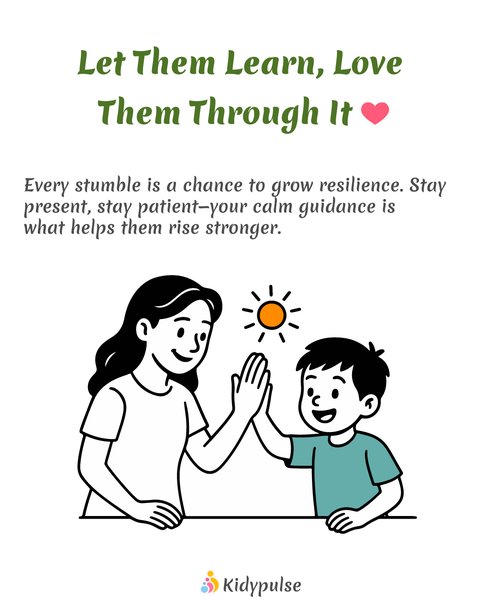
FAFO is a colloquial, modern label for the timeless and powerful parenting tool of natural consequences. While the name is provocative, the principle it represents is soundly rooted in developmental psychology. It is most effective and safest not as a rigid, standalone philosophy, but as a flexible tactic employed within a warm, connected, and authoritative parenting framework.
The ultimate goal of this approach is not to be harsh or to manufacture failure for children. The goal is to provide them with the space to learn and grow within firm, loving boundaries of safety and support. By allowing children to face manageable challenges and learn from the outcomes, parents equip them with the resilience, problem-solving skills, and self-confidence needed to navigate life's inevitable complexities. This requires parents to move beyond their own instinctual fear of their child's discomfort and to trust in their child's innate capacity to learn. In doing so, they give their children a lasting gift: the quiet confidence that comes from knowing they are capable of figuring things out for themselves. This is the core of
Sources used in this blog
Heard of FAFO parenting? Here's WHY it could (actually) be ...
Parents are split on 'FAFO' parenting style that emphasizes natural consequences
FAFO Parenting: Letting Kids Learn the Hard Way - Nashville Parent
FAFO parenting is the trendy way to let kids 'find out' consequences. But is it cruel to let them fail?
FAFO parenting is the trendy way to let kids 'find out' consequences ...
Is FAFO Parenting A Much-Needed Response To Gentle-Parenting Burnout? - Betches
What Is FAFO Parenting? - The Bump
Learning from Mistakes: Why We Need to Let ... - Bright Horizons
Introducing the new style of parenting - FAFO - The Independent
'I'm a parenting expert, this is why I don't recommend FAFO parenting – and what to do instead to 'reap the rewards in the teen years' - Netmums
FAFO Parenting Is Trending but What Do Experts Think? - PureWow
Gentle Parenting vs. "FAFO" Parenting — Head & Heart Family ...
254: What is FAFO Parenting? The 9 Most Important Things Parents Should Know

Comments
No comments yet. Be the first to leave a comment!